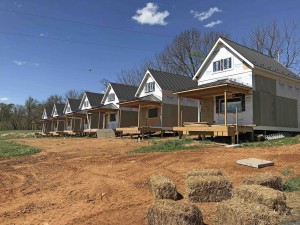In recent days, Chairwoman Phyllis Randal said, “The [Loudoun County] Board of Supervisors ha[s] made it a priority to preserve our farmland and support those who are putting their land to great use.”
A recent USDA report concluded that, as of 2017, Loudoun County had 1,259 farms covering 121,932 acres.
There is good and bad news in this USDA report.
The bad news is that the number of farms are shrinking and we are losing acreage.
The good news is that there is an uptick in farm income, even as there is a loss of farm acreage and despite a serious reduction in federal funds that previously supported Ag in Loudoun County.
The data suggests that residential development, relentlessly pushed upon the County over the objection of residents, puts the County’s growing Ag income at risk.
Developers are insisting on more and more residential housing in the Western rural areas of Loudoun County and, if successful, that will necessarily shrink the farm acreage dramatically, and compromise or end entirely the growth of the AG economy – in other words – we are in danger of killing the golden goose.
There is a USDA web site of “quick [AG] stats” that allow each of us to make our own analysis of the stats – from across Virginia and even drilling down to Loudoun County.
First, you will find that Loudoun’s farm acreage has been steadily shrinking since 1997, at 196,012 acres, then 2002, at 164,753 acres, then 2007, at 142,452 acres, then 2012, at 134,792, and 2017, at 121,932 acres.
Still, crop sales increased over this same period from $11,533,000 (’97), to $19,099,000 (’02), to $19,518,000 (’07), to $26,089,000 (’12), to $30,890,000 (’17).
Farm sales increased somewhat over 2012 by 2017 for farms making up to $99,000 a year, and those that made $100,000 or more.
There was a slight increase in machinery asset value.
The County has a vibrant Ag economy; the question is will development policies destroy that economy.
There was a significant drop off in government program receipts from $497,000 in 2012, to $190,000 in 2017. There should be an examination of how that could have happened.
Loudoun County is rightly proud of the mix of products from hay to hogs and goats to grapes, plus products made from Loudoun-grown raw materials, such as beer, wine, cheese, honey and wool. Loudoun is doing something right. But more needs to be done.
Loudoun’s Economic Development Director, Budd Rizer, promised, “The results of this census will help inform our decisions about our programming to support rural business development, workforce, ag education and much more over the next several years.”
The rub is whether those decisions include a realization that more residential housing in Western Loudoun is not a program that supports rural farms and Ag..

